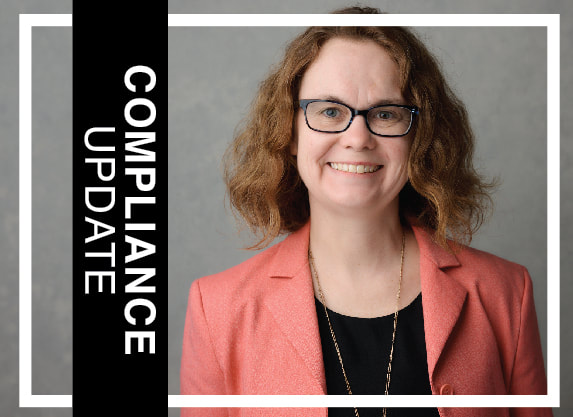|
by Amy Kleinschmit, Chief Compliance Officer
Elder Abuse Webinar The National Credit Union Administration (NCUA) will be hosting a free webinar on May 18 titled “Reframe the Shame: A Conversation About Financial Crimes Against Older Adults.” The NCUA will be joined by representatives from AARP and CFPB. Registration can be found here. AARP will discuss how society views and treats victims of frauds and scams, the language used when discussing frauds and scams against older Americans, and the detrimental impact it may have on this population, especially when reporting financial crimes. The NCUA and CFPB will share best practices and resources available to raise awareness and reduce the potential for financial crimes against older adults. BSA Enforcement Action The Financial Crimes Enforcement Network (FinCEN) issued a $1.5 million Civil Money Penalty against a South Dakota trust, although the majority of its employees are located in Kentucky. FinCEN identified hundreds of suspicious transactions for which the Trust failed to timely and accurately file a SAR. As discussed in the civil money penalty, the trust primary offerings are the provision of custody services to individuals with self-directed individual retirement accounts (IRAs), as well as acting as a qualified custodian for investment advisers. However, during the Relevant Time Period, the Trust also engaged in the business of providing account and payment services to foreign securities and investment firms as well as other businesses, including money services businesses. The trust company is a “bank” under BSA rules and regulations, therefore it is subject to the same requirements as credit unions, such as reporting suspicious activity. As noted in the civil money penalty, “The Trust process for identifying and reporting potentially suspicious activity was severely underdeveloped and ad hoc, resulting in its willful failure to timely and accurately file SARs. Trust personnel with AML responsibilities have acknowledged not fully understanding federal SAR filing requirements and that they may have missed important information about some of their riskiest clients as the result of maintaining other, non-AML responsibilities.” FinCEN went on to find deficiencies were exacerbated by the Trust’s failure to recruit sufficient personnel with experience in AML compliance, including SAR filing obligations, even after the Trust expanded into a new line of business offering services to customers that had elevated risks of money laundering. As explained in the FFIEC BSA/AML Examination manual, “The act by the bank’s board of directors of appointing a BSA compliance officer is not, by itself, sufficient to meet the regulatory requirement to establish and maintain a BSA/AML compliance program reasonably designed to assure and monitor compliance with the BSA. The board of directors is responsible for ensuring that the BSA compliance officer has appropriate authority, independence, and access to resources to administer an adequate BSA/AML compliance program based on the bank’s ML/TF and other illicit financial activity risk profile.” Some additional issues with the Trust’s BSA program included:
NCUA – LIBOR Transition NCUA has issued letter to credit unions 23-CU-03 to provide a joint statement on completing the LIBOR transition. Credit unions need to take all necessary steps to prepare for an orderly transition away from LIBOR by June 30, 2023. As noted in the joint statement, credit unions are encouraged to ensure that replacement alternative rates are negotiated where needed and in place in advance of June 30, 2023, for all LIBOR-referencing financial contracts including investments, derivatives, and loans. Institutions are also encouraged to work expeditiously with their customers and coordinate with other institutions as needed in these efforts. In addition to NCUA’s recent letter, the CFPB has also issued a number of resources on the LIBOR transition including FAQs that can be found here. CFPB Advisory Opinion: Time-Barred Debt The CFPB issued this Advisory Opinion which discussed how time-barred debt is to be treated under the Fair Debt Collection Practices Act/Regulation F. To that end, this Advisory Opinion applies to debt collectors as defined in section 803(6) of the FDCPA and implemented in Regulation F, 12 CFR 1006.2(i). The Advisory Opinion provides that Regulation F prohibits a debt collector from suing or threatening to sue to collect a time-barred debt. As the CFPB explained in finalizing this prohibition, “a debt collector who sues or threatens to sue a consumer to collect a time-barred debt explicitly or implicitly misrepresents to the consumer that the debt is legally enforceable, and that misrepresentation is material to consumers because it may affect their conduct with regard to the collection of that debt, including whether to pay it.” Regulation F’s prohibition on suits and threats of suit on time-barred debt is subject to a strict liability standard. That is, a debt collector who sues or threatens to sue to collect a time-barred debt violates the prohibition “even if the debt collector neither knew nor should have known that a debt was time barred.” Accordingly, a debt collector who brings or threatens to bring a state court foreclosure action with respect to a time-barred mortgage debt may violate the FDCPA and Regulation F. This is true even if the debt collector neither knew nor should have known that the debt was time barred. DakCU members may contact Amy Kleinschmit with any compliance related questions. Comments are closed.
|
The MemoThe Memo is DakCU's newsletter that keeps Want the Memo delivered straight to your inbox?
Archives
July 2024
Categories
All
|
|
Copyright Dakota Credit Union Association. All Rights Reserved.
2005 N Kavaney Dr - Suite 201 | Bismarck, North Dakota 58501 Phone: 800-279-6328 | [email protected] | sitemap | privacy policy |





